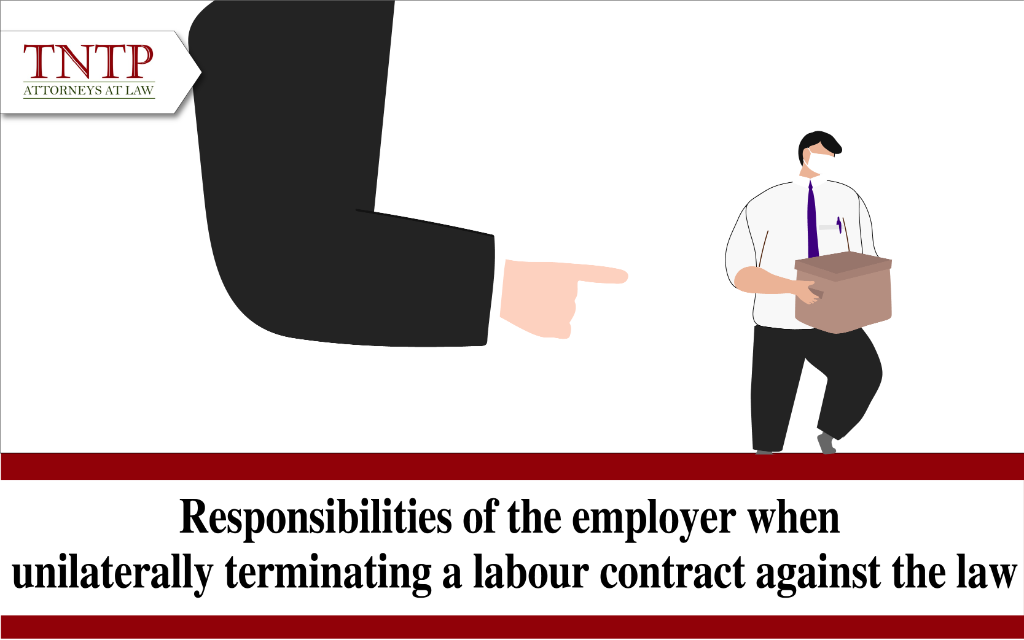The employer is responsible for providing work and paying salary to the employee, ensuring a safe working environment, complying with legal regulations, and respecting the rights of the employee. However, many employers have failed to fulfil their responsibilities, unilaterally terminating labour contracts unlawfully, significantly affecting the employee’s rights. Thus, in cases of unlawful unilateral termination of labour contracts by the employer, what responsibilities can the employee demand from the employer? In the following article, TNTP will detail the responsibilities the employer must bear when unilaterally terminating labour contracts against the law.
1. Responsibilities of the employer when unilaterally terminating labour contracts
According to Article 46, Article 48, Clause 3 of Article 113 of the 2019 Labor Code (“LC”), when unilaterally terminating the labour contract with the employee by or against the law, the employer still has the following responsibilities towards the employee:
(i) Fully settle all relevant amounts related to the employee’s entitlements (salary, termination allowance, salary for unused annual leave days, etc.) within 14 working days from the date of labour contract termination. However, this period may extend, but not exceed 30 days, in the following cases:
a) The employer is not an individual terminating activities;
b) The employer changes the structure, technology, or for economic reasons of the enterprise;
c) Division, separation, merger, amalgamation; sale, lease, conversion of the enterprise type; transfer of ownership rights, use rights to the assets of the enterprise or cooperative;
d) Due to natural disasters, fires, enemy actions, or dangerous epidemics.
(ii) Complete the procedures for confirming the period of social insurance, and unemployment insurance, and return the original copies of other documents held by the employer;
(iii) Provide copies of relevant documents regarding the employee’s work process if requested. Costs of copying and sending documents are borne by the employer.
The employee should note the following: In cases where annual leave has not been taken or not all annual leave days have been used, the employer must pay salary for the remaining unused leave days; the employer must provide termination allowance for the employee who has worked regularly for the employer for at least 12 months, receiving half a month’s salary for each year worked, except in cases where the conditions for receiving retirement benefits are met according to the regulations of social insurance, or the employee voluntarily resigns without valid reasons for five consecutive working days or more.
Depending on the enterprise’s internal documents and agreements between the employee and the employer, the employer may also have additional responsibilities when terminating labour contracts, such as paying support amounts. Therefore, when faced with unilateral labour contract termination by the employer, the employee should rely on legal provisions, internal regulations of the enterprise, and agreements between the parties to determine the responsibilities that the employer must fulfil. If the employer fails to comply or incompletely complies, the employee has the right to demand that the employer fulfil all the responsibilities.
2. Responsibilities of the employer when unilaterally terminating labour contracts unlawfully
When unilaterally terminating the labour contract unlawfully, in addition to fulfilling the responsibilities defined in the first part of the article, the employer must also bear the responsibilities stipulated in Article 41 of the LC, which include:
(i) The employer must reinstate the employee to work according to the labour contract that was concluded, pay salary, contribute social insurance, health insurance, and unemployment insurance for the days the employee was not able to work and pay an additional amount to the employee of at least two months’ salary according to the labour contract.
(ii) In case of violating the notice period requirement, the employer must pay an amount corresponding to the salary according to the labour contract for the days without prior notice.
(iii) If the originally assigned position or work in the labour contract is no longer available, and the employee still wants to work, both parties must agree to amend or supplement the labour contract.
(iv) In cases where the employee does not wish to continue working, in addition to the mentioned payment, the employer must provide a termination allowance to end the labour contract.
(v) If the employer does not want to re-employ the employee and the employee agrees, in addition to the mentioned payment and termination allowance, the parties must agree on additional compensation for the employee, but at least equivalent to two months’ salary according to the labour contract to terminate the labour contract.
The employee should note the following: After being re-employed, the employee must reimburse the termination allowance, and unemployment allowance if received from the employer.
Thus, when unlawfully unilaterally terminating the labour contract, the employee can request the employer to undertake the responsibilities according to legal regulations.
The above is the article “Responsibilities of the employer when unilaterally terminating a labour contract against the law” that TNTP sends to the readers. In case of issues requiring discussion, please contact TNTP for assistance.
Best regards,








